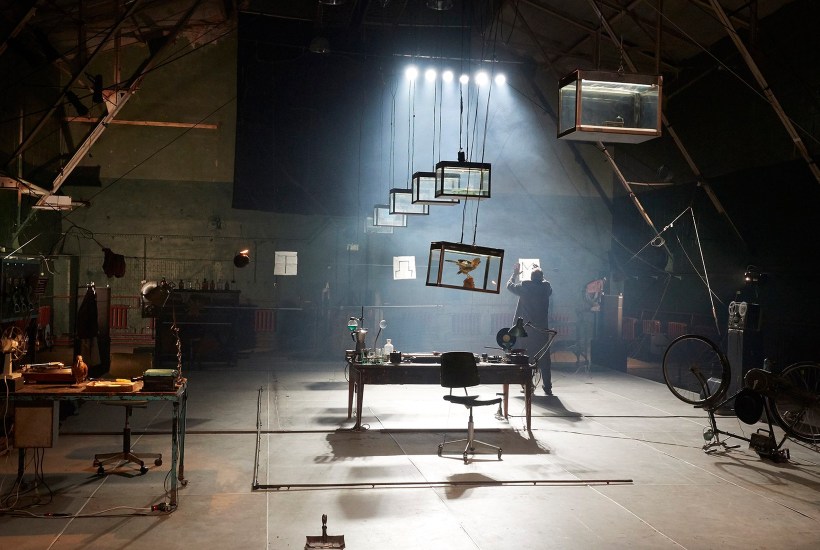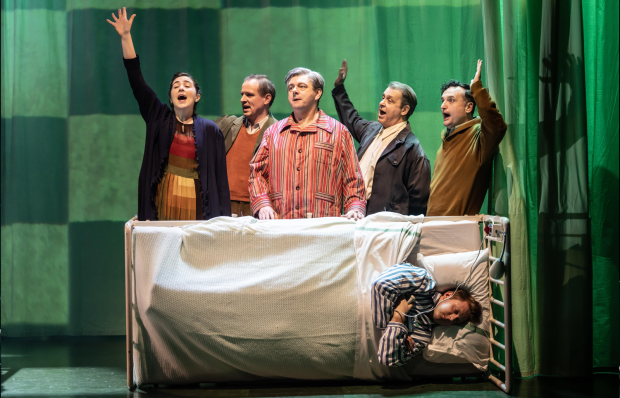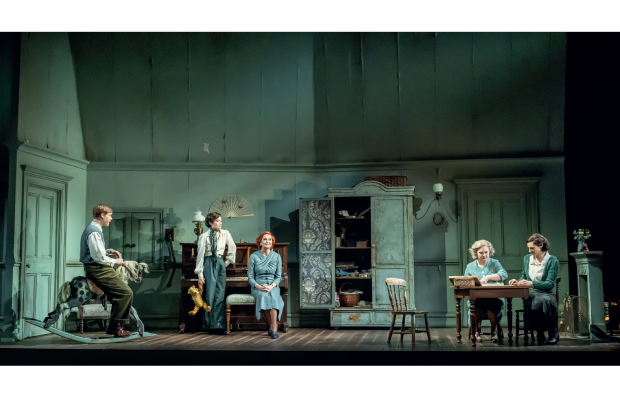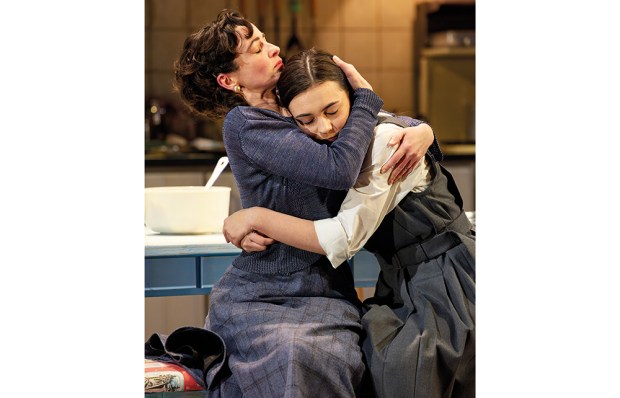The Finborough’s new show is a love story with the male partner absent. Two women, one Irish and one American, explain their feelings for a London businessman, aged 45, who seems to be connected with the fashion trade. The women, known as ‘I’ and ‘A’, have different functions. ‘I’ is a young Irish model and ‘A’ is the absent man’s co-worker. Both are besotted with him for obscure reasons. We know nothing about him except that he visits east London every Sunday to devour his parents’ roast dinner. ‘A’ attends these meals but ‘I’ is excluded so she texts him snaps of her boobs instead. The women aren’t remotely troubled by his cold, exploitative attitude. He uses ‘A’ for friendship and ‘I’ for sex. As soon as their affair begins he tries to demolish her ego. He tells ‘I’ that she lacks the confidence to ‘rock the red carpet in high heels’. It’s her fault that she doesn’t enjoy sex, he explains, because she’s not old enough to have proper orgasms. Obviously, this is a ploy to disguise his feeble performance but she trusts every word he says about her.
It becomes increasingly hard to believe that ‘I’, a beautiful 29-year-old brunette, would want to date a middle-aged swine who detests her neediness. ‘Why do I always end up with the clingers?’ he rants. When she bursts into tears she blames herself for bothering him. ‘I make a note never to bring up issues.’ Some of the fault lies with her because she regards their affair as a giddy little adventure. ‘I want us to look like it does in films,’ she simpers. ‘An Instagram relationship to make people jealous.’ It gets worse. She suggests that the creepy tyrant has a violent streak. At first she makes excuses for him. ‘He wouldn’t harm a fly.’ Later she finds his brutality exciting and describes her fantasy ‘to stand before the beast and transform him into a man’. At the same time she describes herself as ‘an empowered woman’.
After 18 months of mistreatment, she drops hints that he ought to declare his love for her. He declines. She takes the initiative and confesses that she adores him. He asks her to leave. She’s distraught. He sulks. She blames herself again. ‘What could I do to make myself his equal?’ And so this grotesque drama plods on.
There are 28 filmed episodes lasting about six minutes each, and the full show runs to nearly three hours. And yet we never learn the women’s names or any details about their friends or families. They don’t even tell us why they came to London. Their sole interest in life is to share gossip about a heartless monster who seems to have hypnotised them. Some playwrights deliberately withhold information to add mystery and intrigue to the story. It doesn’t work here. The lack of background details makes the women seem like brainwashed noodle-heads rather than human beings. And the soundtrack is hard to follow because the actors, filmed in arty poses, often speak with shadows across their mouths. The director has overlooked a useful theatrical adage: ‘An actor that can’t be seen can’t be heard.’
Max Black, or, 62 Ways of Supporting the Head with a Hand is a one-man show produced by Stanislavsky Electrotheatre in Moscow. Black was a linguistic philosopher, born in 1909 in Baku, whose family migrated to Britain when he was small. After the war he taught in America. Academics know his name. The play is a chaotic extravaganza presented by an actor in full Professor Brainstorm mode: white lab coat, tie askew, mad staring eyes. He sits at a bench full of instruments and bottles of acid. Above him dangle metal tanks that might contain fish or birds. Nearby stands an upside-down bicycle whose spinning wheels emit silvery ribbons of static electricity.
The show looks like one of those practical science lectures that young kids, especially boys, adore. Unfortunately nothing is explained. No lesson is delivered. The professor mutters streams of digits and solves equations in his head while experimenting with frequencies using a stringed contraption. Random thoughts occur to him. ‘I love lightning flashes. So vast, so brief. Enormity in an instant.’
He hooks up some spinning toys to an electrical fan while musing on the source of creativity. Inventiveness arises, he says, from a lack of symmetry, therefore newborns should receive a sharp knock on the skull to unbalance their brains. There’s a joke in there somewhere. The same goes for his speech about the placement of one’s hands in relation to one’s head while posing for a portrait. It’s nearly funny but not quite.
This show is aimed at experts in linguistic philosophy who will enjoy an arbitrary rummage through Max Black’s numerous preoccupations. Lay folk will be baffled.
Got something to add? Join the discussion and comment below.
Get 10 issues for just $10
Subscribe to The Spectator Australia today for the next 10 magazine issues, plus full online access, for just $10.
You might disagree with half of it, but you’ll enjoy reading all of it. Try your first month for free, then just $2 a week for the remainder of your first year.














Comments
Don't miss out
Join the conversation with other Spectator Australia readers. Subscribe to leave a comment.
SUBSCRIBEAlready a subscriber? Log in